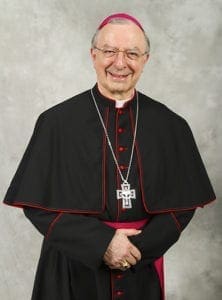The Lord of Christmas and Easter
By BISHOP JOEL M. KONZEN, S.M. | Published December 28, 2022
You might have heard in your religious education that Christmas, despite the almost universal recognition that accompanies it, is not the greatest Christian celebration. That designation belongs to Easter. Our reaction might be, “Really? Easter doesn’t seem like the event, the feast, that captures our imagination and attention the way that Christmas does.”

Bishop Joel M. Konzen, S.M.
Much of our regard for Christmas has been shaped by the secular immersion in decorating, gift-giving, seasonal music, greeting cards, breaks from school and work—reinforcements that now are often lumped together simply as what we do at “the holidays.” Most of those features are not present at Easter. It is, though, the Resurrection of Our Lord that brought to joyful fulfillment the promise contained in the coming of the God-Man, Jesus, among us. Jesus comes as a mere seed, rises to the stage of a budding plant in his ministry, and then blooms spectacularly in the Resurrection.
But Christmas captures our hearts. It is Jesus as a baby, to be sure, that speaks to our faith and to our human capacity to love and to welcome the child in our midst. We respect, too, what it took for Mary to consent to God’s wish that she carry this child, not knowing how this extraordinary baby would change her life as well as the lives of so many others. The union of God’s divine intentions and our human condition and surroundings are brought together in a story that reminds us of the value of humility at the same time it lifts Our Lord on high as the one who will rise to be our King.
At Christmas, as well as throughout our year, it is in the Eucharist that we sit up and realize that Christmas and Easter must be one for us. We must adore the infant Jesus as the One we know will rise at Easter after suffering unjust blows for our sake. He who came in peace and gentleness will endure violence and inhuman mockery, and his followers will give him up as defeated—until his glorious appearance as Risen Savior. It is in the Eucharist that we observe every one of those facets of the life of Jesus, which is why we sometimes have a hard time describing to those outside of our Catholic tradition how it is that this action of priest and people holds such power over us and never really lets us escape its grip.
The Eucharist, the perfect act of thanksgiving, also ignites in us a very basic gratitude for our life, for the life of those we love, and for all human life, including that of the unborn and those who have been in any way abused or neglected, at the same time that we offer praise and thanks for the saving action of Jesus Christ. This is what inspires many to make an offering at Christmas for the sake of those who are unloved or who lack essential services and care.
Our coming together as a family of faith at the Eucharist is a potent reminder, when we encounter and embrace Our Lord in his body and blood, that we are his by virtue of his tremendous love and we live with a sense of unfinished business captured in Psalm 116, “How can I make a return to the Lord for all he has done for me?”
In 2023, as a Catholic community, we will see eucharistic processions taking place, we will hear homilies and instruction regarding the great blessing we enjoy through the holy Eucharist, and we will have the chance to renew the commitment we made when we first received Our Lord in holy Communion—to regard this singular gift as the substance and support of our life of faith.
Let the Christmas season—all the way to the Baptism of the Lord three weeks later—be a time to consecrate our intentions for the new year, with the saving reality of Christ, word and body, divine and human, the Lord of Christmas and Easter, at the heart of those intentions.